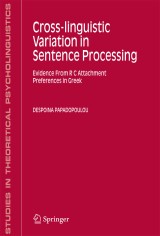Details

Cross-linguistic Variation in Sentence Processing
Evidence From R C Attachment Preferences in GreekStudies in Theoretical Psycholinguistics, Band 36
|
96,29 € |
|
| Verlag: | Springer |
| Format: | |
| Veröffentl.: | 27.08.2006 |
| ISBN/EAN: | 9781402046902 |
| Sprache: | englisch |
| Anzahl Seiten: | 248 |
Dieses eBook enthält ein Wasserzeichen.
Beschreibungen
The central question that I will pursue in this study concerns the universality of the human sentence processing mechanism. It will be explored whether there are cross-linguistic differences in parsing by p- senting psycholinguistic evidence from Greek. Empirical data collected from both native speakers and second language learners of Greek will be used to assess various parsing models and to investigate parsing mechanisms employed in Greek. The results from the L2 learners will be additionally used to shed light on the nature of sentence processing in a second language. Moreover, a supplementary objective of this study is to provide insights into the question of whether discourse biases guide initial parsing choices. The goal of any theory of sentence processing is to determine how people arrive at the desired interpretation of a given sentence, attem- ing thus to investigate the very nature of the human language processor. Sentence processing is a rapid and automatic process, one which ‘is closely linked in time to the input’ (Garrett, 1990: 136, Pickering, 1999). This means that sentence processing proceeds in an incremental fashion, once each word is encountered, it is integrated to the sentence analysis. Sentence processing necessarily involves a syntactic analysis of the sentence, usually referred to as parsing, which allows the reader or listener to identify the syntactic role of words within each sentence, and an analysis which involves the use of semantic and pragmatic information to arrive at a plausible interpretation.
Sentence Processing Models.- Aspects of the Grammar of Greek.- RC Attachment Preferences in Isolated Sentences.- Context Effects in RC Attachment Preferences.- Ambiguity Resolution Strategies in a Second Language.- Conclusion.
<P>This book argues in favour of cross-linguistic variation in sentence processing by providing empirical data from ambiguity resolution in Greek as L1 and L2. It is maintained that in highly inflected languages, like Greek, initial parsing decisions are determined by the interaction of morphological and lexical cues rather than by universal parsing principles. During the initial parse, discourse-level information is constrained by lexical considerations, which indicates that the human sentence processor is a multi-stage mechanism. The L2 data show that parsing preferences are not totally determined by frequency records and that L2 sentence processing is mainly guided by lexical information and less so by other sources of information.</P>
Provides data from ambiguity resolution in Greek as L1 and L2

















